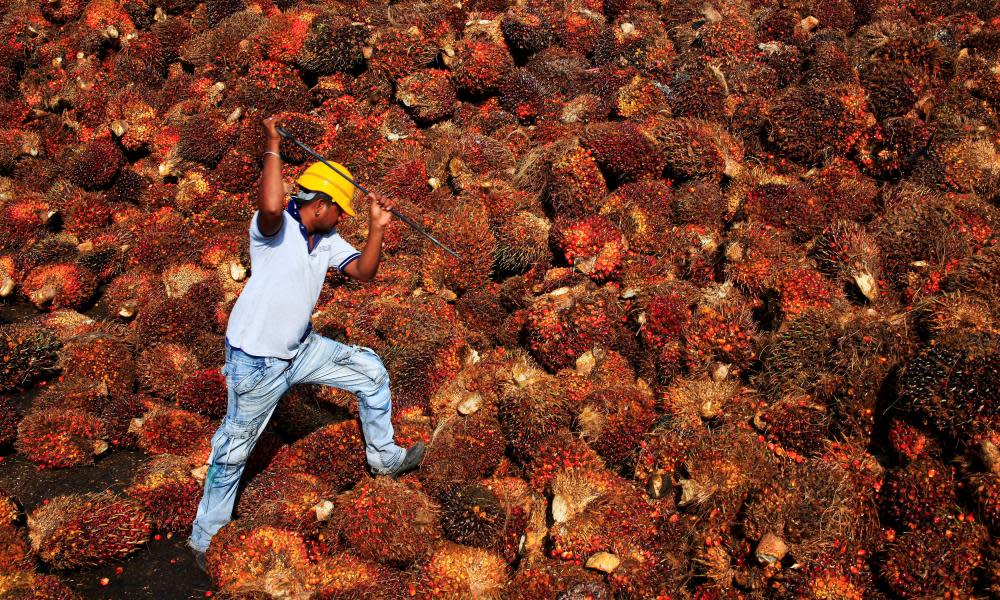Malaysian prisoners may face 'forced labour' on palm oil plantations

Prisoners are expected to be put to work on Malaysia’s giant palm oil plantations to make up for an acute labour shortage heightened by the coronavirus pandemic.
But workers’ rights experts have warned that the proposal by the country’s palm oil producers may constitute “institutionalised forced labour” in an industry already accused of widespread abuse and exploitation of workers.
Malaysia is the world’s second largest producer of palm oil after Indonesia, producing around 25% of the global supply. Palm oil is found in almost half of the packaged products in supermarkets in the UK, from peanut butter to shampoo.
Malaysia’s palm oil producers rely heavily on cheap foreign labour, mostly from Indonesia, Bangladesh, Nepal and India, which makes up more than 80% of the plantation workforce.
Related: Vulnerable prisoners 'exploited' to make coronavirus masks and hand gel
The pandemic has exacerbated an existing labour shortage, with foreign workers unable to enter the country, leaving plantations facing a shortfall of around 40,000 workers.
A government policy to recruit Malaysian workers has largely failed because local people have proved reluctant to sign up for the work, which is often described as difficult, dirty and dangerous.
Palm oil producers are now looking to prisons and drug rehabilitation centres for workers, but a workers’ rights expert has said that producers should focus on eradicating existing abuse in the industry, rather than trying to recruit from other vulnerable groups.
“We should be wary of looking for alternatives that perpetuate poor labour practices, especially in the context of such unequal bargaining power,” said Liva Sreedharan, a specialist in migrant and labour rights.
Sreedharan, who has researched working conditions in the industry for three years, said many of the workers she has interviewed were victims of forced labour, a contemporary form of slavery. They described abuses including passport confiscation, failure to provide work contracts, arbitrary fines and penalties, failure to pay the minimum wage, sexual harassment and physical threats and abuse by plantation managers.
On Sunday a worker from Bangladesh died when he fell into a waste boiler at a palm oil mill, according to local media.
You may not have heard of palm oil but you certainly eat it, probably every day. It is the most widely consumed vegetable oil in the planet, representing a third of all vegetable oil. It is used in many foods, from margarine, chocolate and cookies to bread and instant noodles.
About a quarter of all palm oil is used for other things, such as shampoo, soap and lipstick. It is also burned as biofuel in vehicles, though the EU is phasing this out.
Palm oil drives the destruction of tropical forests, especially in south-east Asia. Orangutans, the world's largest tree-dwelling mammals, are particularly under threat as their habitat is cleared for plantations, as well as species of elephant and rhino. About 20% of palm oil is now certified as "sustainable", though critics say the environmental benefit is marginal.
To avoid palm oil, the most important thing consumers can do is read the label. A small but increasing number of products are now labelled as palm-oil-free. They may cost more, as palm oil is so widely used because it proved a cheap substitute to traditional fats such as cocoa butter in chocolate. However, some alternatives have their own problems: cocoa butter, for instance, has been linked to slavery and child labour.
“Why aren’t these issues being addressed instead of looking for workers who may be more willing to accept substandard work conditions due to their circumstances? Is it because [prison labour] is easier to exploit and they have little room to reject the offer of work or access complaints mechanisms?” Sreedharan said.
Sumitha Shaanthinni Kishna, a lawyer and director of Our Journey, which advocates for the rights of migrant workers, said while the scheme could provide inmates with a source of income and savings when they leave prison, the government must guarantee participation is voluntary. “Consent is needed to ensure this initiative is not seen as forced labour,” she said.
According to the UN’s International Labour Organization, if a company uses prison labour it must, “ensure that if a prisoner refuses the work offered there is no menace of any penalty”.
But industry leaders have defended the plans, saying that prisoners will gain valuable training and skills to help them reintegrate into society.
“It’s a win-win situation for the prisoners and for the industry,” said Ahmad Parveez Ghulam Kadir, director general of the Malaysian Palm Oil Board, a government body responsible for promoting the industry.
Nageeb Wahab, chief executive of the Malaysian Palm Oil Association, said prisoners have been put to work on plantations since 2016, but the new proposal would “intensify” the programme.
Wahab insisted the scheme, which would be for low-risk prisoners near the end of their sentence, would be voluntary. Prisoners would be paid not less than the minimum wage of 1,200 ringgit (£225) a month.
“It’s a stopgap measure,” said Wahab. “This pandemic has opened our eyes that we are dependent on foreign labour. We need to increase our automation and mechanisation. We have to do it yesterday.”


